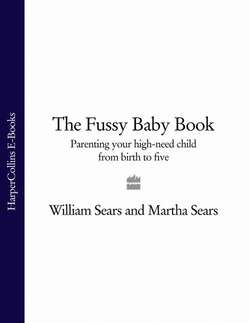Читать книгу The Fussy Baby Book: Parenting your high-need child from birth to five - Martha Sears - Страница 42
supersensitive
ОглавлениеHigh-need babies are keenly aware of the goings-on in their environment. “Easily bothered”, “quickly stimulated”, “like walking on eggshells” is how parents describe their sensitive babies. High-need babies prefer a secure and known environment, and they are quick to protest when their equilibrium is upset. They startle easily during the day (for example, we learned not to turn on the blender if Hayden was anywhere nearby) and settle with difficulty at night. While you can carry on normal family life without waking most sleeping infants, these babies often awaken at the slightest noise. These supersensitive infants are unlikely to accept substitute caregivers willingly.
This acute sensitivity to their environment can become a rewarding asset as a high-need child grows. These children are more “tuned in” to what is going on around them. Their keen awareness stimulates their curiosity, which in turn stimulates learning. They are not distant children. They become kids who care, more easily bothered by another child’s hurts. Most develop empathy, a quality that is lacking in many of today’s teens and adults. Because these children are so sensitive, they develop great discernment and are able to consider the effects of their behaviour on the feelings of others. They are able to achieve one of the ultimate qualities of self-discipline: the ability to think through what they’re about to do.
